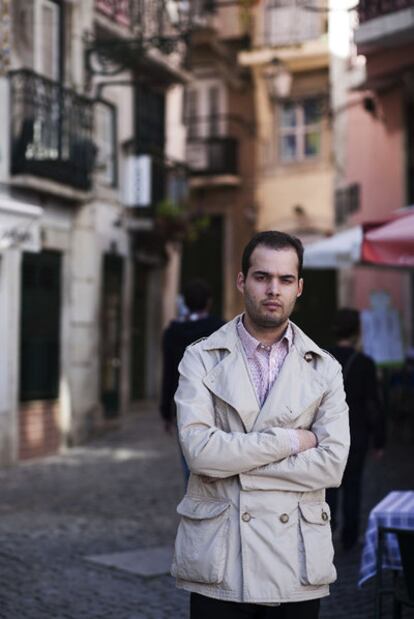When social networking triggers a mass movement
Facebook post brings out 300,000 to protest in Portugal
Alexandre de Sousa Carvalho's life was transformed over a matter of days. His name is the first of four that appear under a manifesto published on Facebook on February 5. The post called for a street demonstration in Lisbon by Geração à rasca, a Portuguese expression that could be translated as "The generation in need."
"The document speaks for all the unemployed, those stuck on 500 euros a month, other low wage earners, the slaves in disguise, the temporary workers... and it calls on them to speak out against the dangers of the job market and to defend their dignity," explains de Sousa, a 25-year-old international affairs graduate.
Five weeks later, on March 12, tens of thousands of people - a total of 300,000 in Lisbon and 80,000 in Porto, according to organizers - took part in two of the largest protests seen in recent times in Portugal. There were no political parties or unions behind the demonstrations - just four college pals who used their willpower and ingenuity to turn a drop of water into an entire ocean.
"Now we need to get organized, come up with ideas and define what it is we want"
"We always believed that job insecurity is a problem across the board. It's not just young people - people of all ages have serious trouble making ends meet, and no way of changing their situation," says De Sousa, who was a member of the Communist Youth Group for five years and later studied in Britain.
He got to know the three other activists behind the street protests at Coimbra University: Paula Gil, 26 (his girlfriend); João Labrincha, 27 and António Frazão, 25. The four friends would talk for hours about the situation in Portugal, but what really triggered their initiative was a song by a band called Deolinda, Qué idiota que soy (or, I'm such an idiot), and the response it generated from Portuguese youth. One of the verses goes: "What an idiotic world this is, where you have to study to become a slave."
"It was a sign that there were a lot of people ready to make their voices heard," De Sousa notes. And on February 5, one of the four friends, João Labrincha, decided to create the Facebook page Geração à rasca. The blog came later. "He invited all three of us to join his site, we accepted, we in turn invited our friends, and so on... Thanks to Facebook, we were able to reach a lot of people who are aware of their own precarious living conditions. We showed up at the right moment."
So what now? What if nothing happens? "I think it already did," says De Sousa. "The issue is being debated in the media, in parliament; everyone is talking about the protests, about the country's problems. People have to get organized. Sooner or later, we will have to convene some sort of general assembly of the people who were out on the street protesting."
So far, Geração à rasca is a hazy movement that De Sousa, his three friends and around two dozen more individuals are trying to articulate into something more specific. "We need new ideas - we need to define what we want to do."
De Sousa is in a hurry - he is about to be interviewed on cable television. His life has changed a lot quite suddenly. "It changed even more when I emigrated," he adds. "And I will emigrate again." This time his destination is to be Africa.

Tu suscripción se está usando en otro dispositivo
¿Quieres añadir otro usuario a tu suscripción?
Si continúas leyendo en este dispositivo, no se podrá leer en el otro.
FlechaTu suscripción se está usando en otro dispositivo y solo puedes acceder a EL PAÍS desde un dispositivo a la vez.
Si quieres compartir tu cuenta, cambia tu suscripción a la modalidad Premium, así podrás añadir otro usuario. Cada uno accederá con su propia cuenta de email, lo que os permitirá personalizar vuestra experiencia en EL PAÍS.
¿Tienes una suscripción de empresa? Accede aquí para contratar más cuentas.
En el caso de no saber quién está usando tu cuenta, te recomendamos cambiar tu contraseña aquí.
Si decides continuar compartiendo tu cuenta, este mensaje se mostrará en tu dispositivo y en el de la otra persona que está usando tu cuenta de forma indefinida, afectando a tu experiencia de lectura. Puedes consultar aquí los términos y condiciones de la suscripción digital.








































